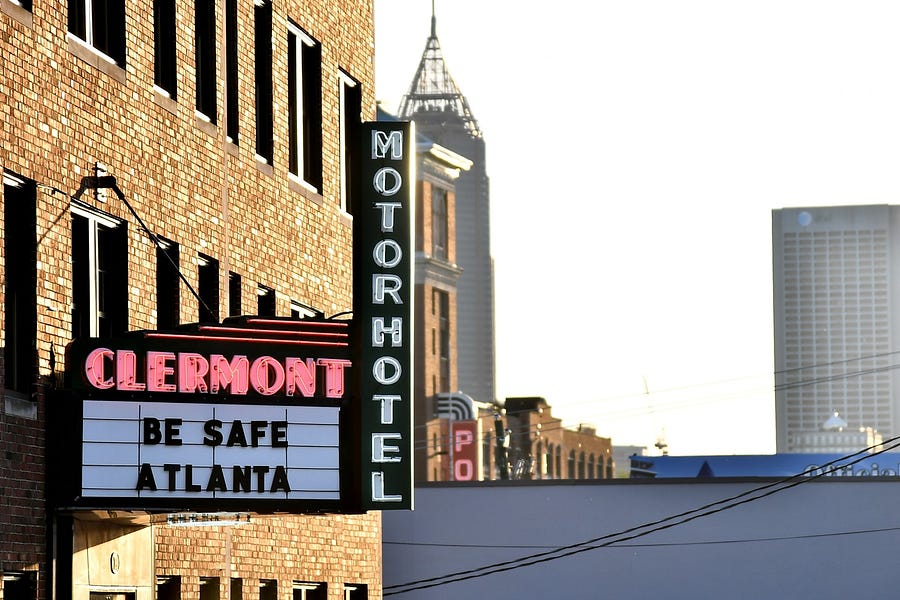Six weeks or so into our new reality (is anyone really counting anymore?), some of our supply chain issues are resolving themselves while new shortages are popping up. It’s possible to find toilet paper most days and grocery stores are mostly stocked. Meanwhile, we are fresh out of new jokes about living in a real-life Groundhog Day and, at least in my house, clean laundry.
If there is a glut on anything—besides potatoes—it’s uncertainty. And it’s everywhere.
The economy, first and foremost. Even though Congress managed to pass a second round of Paycheck Protection Program funding for small businesses after the initial $349 billion ran out quickly, it’s hard to see how there won’t be a need for more funds. In the first round, only 20 percent of small businesses that applied were able to get funds, and there was significant grumbling that larger businesses were bogarting funds that should have been reserved for coffee shop owners, salons, and independent retailers. Meanwhile, another 4.4 million Americans filed for unemployment. Overtipping while ordering takeout and hiring handymen and landscapers who can work safely are helpful things that Americans can do, but we can’t keep everyone working.
As we nervously consider whether it’s safe to start opening businesses back up, all eyes are on Georgia. And no, we aren’t talking about the apparent disconnect between Gov. Brian Kemp, who announced plans to reopen parts of his state’s economy, and President Trump, who criticized those plans just days after telling Kemp he supported the effort. No, the real question surrounds how many businesses will take advantage of the opportunity as business owners weigh the risks of exposing their employees and customers. (More on that below.) Colorado, too, will be opening up in the coming days—another state to watch. Polls show that Americans won’t be rushing back to businesses unless they feel safe.
And that, in the end, is the most frustrating thing of all. The road map that the White House put out, and the reopening plans that have been announced by states (or groups of states working together) are all dependent on testing capacity that we haven’t come close to achieving, and contact tracing and surveillance measures that are still mostly in conceptual phases. People want to go back to work, but they don’t want to get sick. Those of us fortunate enough to have steady jobs and feel secure are eager to release our pent-up demand on all the stuff we’ve been missing since March. But right now it feels like we’re in the middle of nowhere and we’re trying to find our way back, but the map has no compass points and the roads are unfamiliar, and to top it off, it’s in a foreign language.
It’s our goal at The Dispatch to try to cut through that uncertainty and frustration and provide the best reporting and analysis we can. And we look forward to the day we can cover other subjects more broadly. In the meantime, thanks for your support. Now, onto our best stuff from the week.
You’ve probably seen photos of wild animals walking through urban landscapes, or jellyfish swimming through crystal clear waters in Venice. Some of us react by saying, “wow, that’s cool.” And others see this as an opportunity to push their climate change agenda even harder, while trying to ignore that it’s taken a pandemic that has put millions of people out of work to make the air and water a little cleaner. Jonah, in his members-only midweek G-File reacts with a giant sigh. “Yes, it’s true! When all industry and travel grinds to a near halt, emissions will be reduced! Glory be! What these people seem to miss is that they are making their opponents’ point for them.”
As mentioned above, Georgia Gov. Brian Kemp allowed some of his state’s business to open up starting Friday, including gyms, bowling alleys, tattoo parlors, and hair salons. Is it too early? While we’re all eager to get back to normal, polls show that we don’t do so until we feel safe. Declan reached out to almost 20 small businesses across Georgia, and not one told him that they were reopening. And one business owner was surprised by the reaction she got when she announced her family would not reopen its bowling alley right away: “When I put that thing out, I was scared of the backlash that we would get from the people that are like, ‘Oh, y’all are just being crazy, this virus isn’t a big deal,’” Michelle Roland admitted. “But I did not receive one message like that. I couldn’t believe the overwhelming positivity we got.”
You don’t need to homeschool your own children (our COVID-inspired forced experiment with learning at home definitively proves the Larimore kids are better off with the pros, but I digress) to appreciate the fact that America’s education system affords that opportunity to parents. But at Harvard Magazine, professor Elizabeth Bartholet laments that such practices open up children to abuse and “authoritarian control” and—what really seems to bug her—“religious indoctrination. David French’s response to the article? “I have many thoughts.” In his members-only newsletter, He takes apart Bartholet’s argument. “The beauty of school choice—including the choice to homeschool—lies not in test scores (though sometimes test scores can be dazzling), but rather in granting loving parents a better range of options as they seek to raise their children.”
And now the best of the rest of our stuff:
*Sarah looks at the latest polls—on our government’s coronavirus response and the 2020 election—and doesn’t find much good news for President Trump.
*Andrew has a piece on how the Brits are rethinking their plans to allow Chinese company Huawei to build much of their 5G infrastructure in the wake of China’s poor handling of the pandemic.
*Misinformation is almost as contagious as coronavirus, it seems, keeping Alec busy on the fact-checking front. This week he tackled the Bill Gates vaccine conspiracy, whether the CDC director was “totally misquoted” as the president claimed, and whether Steve Mnuchin said Americans could get by on $1200 for 10 weeks.
*Finally, the pods. David and Sarah talked about two big legal decisions, including a Supreme Court decision on requiring unanimous jury verdicts, on Advisory Opinions. Jonah Goldberg interviewed Matthew Ridley about technology and innovation on The Remnant, and Steve and Sarah interviewed White House correspondent Jonathan Karl about his new book, Front Row at the Trump Show, on the Dispatch Podcast.
And now a special announcement for members: A few weeks ago, Jonah and his GLoP podcast-mates Rob Long and John Podhoretz did a live-streamed edition of the podcast on Zoom. It was such a hit they are doing another one Sunday night at 6 p.m. ET/3 p.m. PT. Here’s how to check it out if you’re interested! (And look for an email with more details very soon.)

Dial In Number: US: +1 650 724 9799 or +1 833 302 1536 (Toll Free) Webinar ID: 954 6864 4482
International numbers available:https://stanford.zoom.us/u/aZWkeqbb9
Photograph by Getty Images.







Please note that we at The Dispatch hold ourselves, our work, and our commenters to a higher standard than other places on the internet. We welcome comments that foster genuine debate or discussion—including comments critical of us or our work—but responses that include ad hominem attacks on fellow Dispatch members or are intended to stoke fear and anger may be moderated.
You are currently using a limited time guest pass and do not have access to commenting. Consider subscribing to join the conversation.
With your membership, you only have the ability to comment on The Morning Dispatch articles. Consider upgrading to join the conversation everywhere.